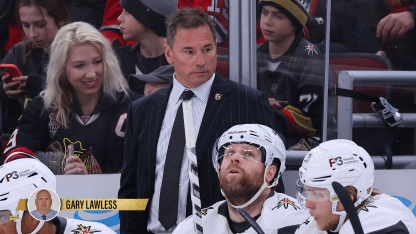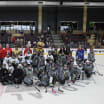With 14 games left on the schedule and already 90 points in the bank, the Vegas Golden Knights are looking more and more like a playoff team. Still, head coach Bruce Cassidy won't go there until it's an actual reality.
Lawless: Checking in with Coach
With his team on a roll and atop the standings, Bruce Cassidy sits down with the VGK Insider

By
Gary Lawless
VegasGoldenKnights.com
When asked if he thinks his team has the stuff to win playoff games, Cassidy shrugs and says, "I don't like to deal in hypotheticals."
Fair enough. But Cassidy, who led the Boston Bruins to six straight playoff appearances including a trip to the Stanley Cup Final in 2019, certainly knows what a playoff team looks like. And there are many ways to get to the answer a reporter is interested in hearing. So, how about this coach: Are the current group of players wearing VGK jerseys a Bruce Cassidy team?
"It's getting there, we're defending well. If you look at our record since the (All-Star) break, our goals against is good, obviously it has a lot to do with goaltending, but we've used five different goalies, and they've all got wins. So, it tells you something about the play in front of them," said Cassidy, who led his team to a 5-3 win over the Philadelphia Flyers on Tuesday. "Getting that message across to the players, 'it's winning time this time of year.' To me, it's hard to turn it on in April, and say 'OK, let's start working on details.' I mean you might get the odd veteran team that can go through a lull this time of year. So, it's really getting close, our guys seem to be valuing that and I love that. They're taking pride in the little things to win hockey games. Finding different ways to win, that will serve us well in the playoffs and we're trending well towards that."
The Golden Knights have been the best team in the NHL since the All-Star break riding a 13-2-2 record to the top of the Western Conference and Pacific Division. The team has an overall record of 42-20-6 through 68 games. The playoff cutoff line in the Pacific Division is projected to be 94 points. Vegas has 14 regular season games remaining to get to that number or better.
Cassidy sat down for a lengthy chat in the lobby of the team hotel in Philadelphia earlier this week.
Gary Lawless: How's your team playing?
Bruce Cassidy: We're playing well, finding ways to win which is most important this time of year. We're not a 60-minute team yet, haven't been all year to be honest with you, so that's still a work in progress. It's important that you find ways to win in different ways, different people are contributing. We're not relying on any one thing.
GL: The whole 60-minute team thing, does it happen at a certain point, or should it be there now?
BC: As a coach, you want it there right away all the time, so that's a little unfair. So no, I don't think any team is at 60 minutes every night. It's a big ask. It will happen. The closer you get to that number, I think you know you've got something. When your lapses are three-four minutes, you give up one goal, you get it back, you get the momentum back, you know maybe you take a couple of penalties, get it back. It's not a whole period or half a game, that's when I think you start to know your team is in a good place.
GL: When you've had glimpses of what your team can look like at its best, how good is it?
BC: Well, I think we can beat anybody.
GL: You do?
BC: There's no doubt. Go through the top teams in the league, we've won in Boston, we beat Tampa and Toronto, be it those were in extra play. We won in Carolina; we should've won in Jersey though, a puck hits our guy with the goalie out, it goes in and we lose on a power play in overtime. So, I look at the top teams we've played very well against, we've won in Seattle, LA, Colorado, so I think we're certainly capable of beating anybody in the league. You can talk about the big games, but you also have talk about the ones where you didn't do as well, that's just the way it is. But a lot more good than bad; that's the way I look at our team, there's a lot more good than bad. We're going to just keep working on, I'm not even going to call them bad, the areas we need to improve on. There are areas that we need to clean up, that's what we have to do.
GL: Do you have the ingredients or the elements that you need to be a true contender?
BC: Yeah, any coach will tell you there's always areas you can improve on so, as I said, I think when our roster is healthy that's when I really say absolutely. We've lost some glue guys, (Mark) Stone, Nicolas Roy, (William) Carrier, these are glue guys, I'd put (Keegan Kolesar) in that category now, we don't know how long he'll be out, hopefully it's not that long. Goaltending you're always a little bit concerned but it seems like we've put different guys in there and they've given us some quality starts, so we've overcome that area that we weren't sure about at the start of the year. Our d-core when healthy is as good as anybody's so, yeah, the injured guys have made us a little vulnerable in areas and we've had to shorten the bench at certain times because of skill sets but we're working through that.
GL: You've started to score. Just eye test - I don't have any data - but it looks like you're scoring around the net an awful lot, which is a positive thing for a team to be successful in the playoffs.
BC: Close to the net, yes. I think we were more of a rush team to start the year. And we've developed a little bit of an interior ice mindset, even with guys out which is encouraging. To me, we are willing to go there more often now and get into the dirty areas, and you have to in the playoffs. You're not going to get odd-man rush after odd-man rush. You'll get some, there are mistakes, and teams are going to miss assignments but in general, everybody's a little more committed to defensive play or away from the puck, that's just the way it is. They'll block an extra shot, they will reload better, they'll make a better decision when they make a play, so you need that. So that's certainly encouraging with guys like (Mark) Stone, his best attribute is scoring around the net, Will Carrier's got 16 goals, I bet 14 or 15 of them are right there, Nic Roy is even an in-tight guy, not a one-timer guy. So, we've lost a lot of that presence. Even (Keegan Kolesar), every goal that he scores is out in front. So, we've got to build that into the guys that do come into the lineup.
GL: If you ever get Stone back, how do you work a guy like that in? It's going to be the playoffs; how do you figure that out?
BC: We haven't gotten that far. As he gets closer and if he gets on the ice, and it's a real possibility, we'll start tinkering with that. He can go anywhere. I'll take him. The good thing about (Stone), is that some guys will miss time and they have to get their timing back, their pace. He's a cerebral player and he's got hands so I don't think his brain is going anywhere. The way he plays the game, I don't think he's that guy that needs weeks and weeks to get himself up to speed. Now having said that, and it's an entirely different animal going into the playoffs, it's another level so we have to temper our expectations. I don't know where he would play right now, it's too hard to tell. Guys are in and out of the lineup but wherever he goes, obviously he's going to help us no matter what so he's going to go in if he's able to.
GL: Kelly McCrimmon went and got three guys at the deadline. Teddy Blueger and Ivan Barbashev, they look like they've been here a long time. They didn't need a big ramp up for it, they just stepped in, and obviously same with Jonathan Quick.
BC: Yeah, they're certainly Bruce Cassidy-type of players. They're cerebral and competitive. To me, those are the really important elements to the kind of game we want to play. Cerebral, to be able to make process reads in the d-zone when you don't have the puck, you want to check well. Competitive, because I just believe in that. Win your battles, win your races is what we talk about all the time. Having those two elements has helped. Quick, he obviously falls into that category too. It's funny, when we used to talk about goaltenders having good hockey IQ, people look at me funny. The job is to stop the puck and the ones with good hockey IQ have longevity. Quick falls into that category, makes a lot of good reads out there, playing the puck, processing the attack. So, all three of them have been really good adds for us. Barbashev gave us some of that inside presence. Blueger can check, he's a good centerman and good in the circle and doesn't look at you funny when you're putting him out there for d-zone starts. Night after night that's what he's used to in Pittsburgh, that's his role and he's bought into it. So that helps a coach, little things you don't see behind the scenes. Some guys are coming up to me all the time, "why can't I start in the o-zone?" Having a guy buy in like that is important.
GL: You come in here, it's a brand-new coaching staff. I don't know if you had any relationships with any of them, did you?
BC: I had a relationship with Chris Davidson-Adams, our equipment guy, because his first job was when I was in Grand Rapids. George McPhee from Washington. Otherwise, I didn't know anyone. I knew Dave Goucher and Shane Hnidy from New England.
GL: I see it, your staff, you guys like each other. You guys have a lot of fun.
BC: We do, I think it's important. One of the things that we tried to build in Boston is that every night before the game we tried to have dinner together. It's kind of a rule that we would meet up in the lobby at six. Our goalie coach was our restaurant reservations guy, another guy picked the appetizer, another guy picked the wine. We were pretty good that way. I've tried to repeat that here, and I think good staffs like each other. I think the players see us together and I believe that's important.
GL: One of the things you hear about you as a coach is, 'Bruce Cassidy finds a way to win.' You've won a lot of games here already, over 40 games this season. Is there something to that?
BC: Well, I mean listen, I've won in this league and there's different reasons for that. The first one usually is having good players, start with that. Have good people around you. I think in-game, there's days you can choose to make adjustments, or you can choose to let the players play through it. And over the years I've been told I've done a good job at making those adjustments in game with the personnel when a guy is going or not going. But yet, getting back to square-one the next day so the player doesn't feel like he's buried. So, you make some of those decisions that you hope are the right ones. You know that after Sunday's game we have a day off Monday so you can tax some guys a little bit more. In Carolina we tried to balance the minutes knowing we had a back-to-back once we had the lead and trust our players. I think they appreciate that, our fourth line playing more than the top line. There's a little bit of that that goes through your head as a coach, thinking in the moment or a little bit ahead on how you're going to use your people. Your top guys playing 22 minutes every night for instance and the fourth line playing eight. I don't believe in that; I don't think it fits as a part of the team and I don't think it's good for team building.
GL: You've grown some players this year. Helped them improve as everyday NHLers. Do you enjoy that? Do you take pride in that?
BC: Enjoy is the wrong word, because you're on them every day to work on their board battles, manage pucks, it gets old. It's the tough part of parenting, building good details and habits is not easy. You've got to stick with it, there's days where it's just, "ugh, it's not worth it." But is it rewarding, absolutely, that's a much better word. Coaching to me, someone said "Is it fun?" I'm like, "Is it fun? Have you ever coached?" Fun is the last word I'd use. (laughter) But it is very, very rewarding, in the end to see players - I don't know if I'd say, "hit their ceiling," but just to get better, get better and take pride in those details. I had coaches that built some of that into me and I believe it made me better. I had some talent and skill but now you round that out with some details that help you win hockey games, and it goes back to your previous question: Why do we win so many games? We can get back to our details and not beat ourselves eventually. That's the coaching part that's the hard work, to get a person to enjoy the stuff that is uncomfortable, let's say, and relish that. Maybe not enjoy it, but value it. I think value is a better word. When you go up and down the lines, there's different guys we've had to work with to do that, over the years. It's usually the younger guys trying to find their way in the league that aren't studs. I know I'm getting long here with my answer, but you have to absolutely coach those details in the players, because most of the time you don't have the puck. That's the part that's difficult, but once the players buys in, they'll make the ultimate call. There's a lot of players that don't, and they end up back in the American League, because they can't outplay the guy that has the same skillset but has better details. So, it's our job to build the second part, the skillset is usually, it's on the scale of figuring out who has what in a player. No, of course you can work on your skills, I'm not saying that. As a coach, I think for the team structure, it's more about the details, the behaviors, the habits, all those things are where we earn our money.


















